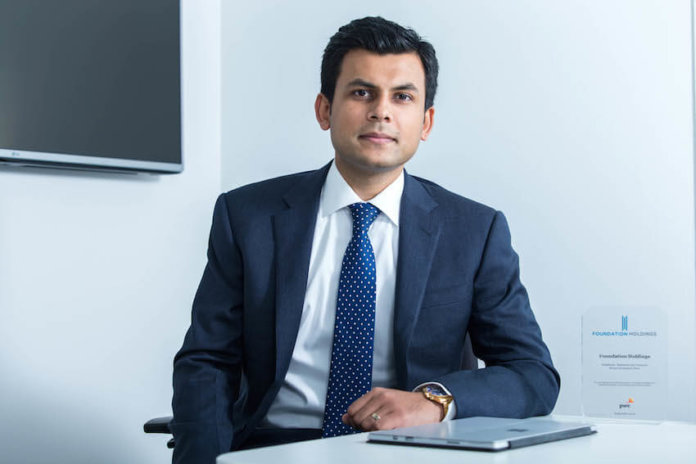
A new investment firm consisting of leading international business figures has been launched to build sustainable, industry-defining companies in high growth sectors in the Gulf Corporation Council (GCC) and India.
Foundation Holdings, a strategic global investment firm, has been created to enhance operational value for companies and IPOs in the healthcare, education and consumer sectors. The firm aims to deploy AED 2 billion in these sectors over the next five years.
Heading the newly-created firm will be Founder and Chief Executive Officer Abhishek Sharma. In this interview, Tharawat Magazine speaks to Mr. Sharma about the firm’s unique investment strategy in high-growth markets and industries.
Tell us about Foundation Holdings and explain to us what its investment philosophy is.
Foundation Holdings is a strategic global investment company focused on the fast-growing healthcare, education and consumer sectors in the Gulf Corporation Council (GCC) and India. Our vision is to build sustainable, industry-defining companies.
Our strategy evolves from our long-term investment philosophy. We want to invest in companies as long-term players. We seek ownership in high quality companies extremely capable of generating revenue. When we invest in a company, we are not concerned with whether the market will eventually recognize its worth; we are concerned with how sustainable and differentiated that company is. We are also focused on the large and fast growing markets here, for example just the healthcare market in the GCC is expected to be $117 billion whilst India will hit $158 billion by 2020 (World Bank).
We like to think of ourselves as business builders and partners. We partner with excellent companies and look at what we can do to make it even better. Our objective is to take these companies to a position where the level of quality, growth and brand enable them to be IPO ready or find them a home on the FTSE 100.
What kind of sectors and companies will Foundation Holdings focus its investment on and why?
Across India and the GCC, the upward trend in healthcare spending is relentless, driven by powerful and enduring factors: ageing populations in the West, rising affluence in GCC and India, and a widespread mindset that expects every new treatment to be instantly available.
These fundamental drivers of growth make healthcare a resilient and compelling sector for investors, especially at times of global uncertainty. Therefore, of particular interest are products and services that help to drive cost out of the provision of healthcare in parallel with improving the quality of service. For example we are watching the ‘Tsunami of diabetes’ hit us – if the growing trend continues, one-fifth of all adults will be defined as obese by 2025.
We will also focus our investments in education, and are especially keen on the higher education segment. We believe universities are reacting with determination and creativity to the new challenges they face. Budget deficits have mushroomed following sudden declines in the oil price, deep cuts in education funding and limits on tuition increases. Additionally competition in the regional job market is making new programs, new training and new models of instruction essential in order for students to earn gainful employment after graduation. And amidst a fluctuating student population, universities are harnessing new technologies as a way to reach even more students.
What kind of entrepreneur or business leader is able to “sell you” on their vision?
We view human capital as the key driver of superior investment returns. I have always been inspired by His Highness Sheikh Mohammed Bin Rashid Al Maktoum’s quote, “A great leader creates more great leaders, and does not reduce the institution to a single person.” Perhaps unsurprisingly for how much the word “disruptive” is thrown around and overused, we love big and bold ideas which entrepreneurs only dream of. Consensus is your enemy, and entrepreneurs shouldn’t be afraid of being contrarian. For example in 1965, Dr. Kassem Alom, a young medical student, embarked on a seven-day boat journey from Beirut to Barcelona to Abu Dhabi. That grueling trip was the start of a journey that led eventually to the foundation of Al Noor Hospitals group, the region’s largest healthcare businesses. As Dr Alom has explained, the basic concept back then, and throughout his time at the business, has been a focus on quality and ethics, and to treat the patient as family.
For us that’s the kind of entrepreneur we value and wish to partner with – someone with big dreams, someone who thinks simply and yet carries the dreams of a lot of younger people.
You explained how your firm will focus on investments in the GCC and India. What is it about these regions that makes them worth investing in?
The Indian and GCC markets offer a combined $4 trillion ecosystem, providing tremendous investment opportunities in the healthcare, education and consumer sectors.
The potential of India continues to inspire us. We all witnessed Prime Minister Modi’s visit to the UAE and GCC last year and the thunderous reception and adulation from the UAE was matched if not surpassed with the same in the UK/US/Japan etc. As a family we have strong roots in India. Both my grandparents were senior government officials including sitting on the Railway and PWD Board. My grandfather sometimes mentions how India had been 23% of the global economy in the early 18th century but that number is down to a mere 4%. I am confident with Prime Minister Modi’s Make in India campaign which heavily supports that India is on the right track.
As Mckinsey & Company has highlighted, six hundred cities are projected to generate more than 60 percent of global growth to 2025. Within this group, companies need to adjust their strategy to include the 577 fast-growing “middleweight cities.” A majority of these will be in India, China and the GCC. We believe new approaches to the delivery of care are abound. For example in India, an entrepreneur has proved that high-quality, no-frills maternity care can be provided for one-fifth of the price charged by the country’s other private providers. We aim to find and support ways to deliver care effectively at significantly lower cost while increasing access and quality in tier 1, 2 and 3 cities in India.
The GCC and India have a strong presence of family-owned companies. What are your thoughts on their impact in the regional economies?
Family businesses are the engine of the world’s largest, most productive and fastest growing economies. Like any privately owned business they continually grow and evolve but have the added complexity of succession, as well as attracting and retaining high quality external management. At some point in the development of a successful family firm, owners will be faced with strategic decisions at key points of change, including how to take the business to the next level. These types of issues are not always resolved within the business and sometimes the situation may point towards a private equity partner with objectivity and prior experience of similar situations.
Historically, we have invested successfully in a substantial number of family-owned firms where we have helped them with the following:
- Entering new geographies and markets
- Accelerating growth plans by sharing vision and risk
- Providing liquidity to shareholders – allowing owners to release some of the value they have built into their business without surrendering control
- Increasing levels of equity for management
- Introducing key resources such as new executive management, non-executive directors, and access to new customers, suppliers and financiers
- De-gearing overstretched balance sheets
We recognized that long term family owners care deeply about continuity and that retaining control of their company can be an important emotional and financial threshold. As such, our work with family firms have taught us that there had to be a shared vision for growth and to enable the family business to draw on our global and local resources and expertise to complement their ambitions.
Having been a financial analyst over the years, what do you think are the qualities of a successful business leader?
Around fifty per cent of investment firms typically use a checklist approach – “Recurring revenue? GM with experience? Good backlog? X per cent of month-over-month growth?” But we feel that there must be an alignment between the human capital and investment strategies. This approach allows leaders to build human capital as a core competency and leverage a talent pipeline rich with individuals who possess the right skill sets and experiences.
We are inspired by Jack Welch’s mantra ultimately – “When you become a leader, performance is no longer about you, it’s about how your team performs. We believe that the world will not belong to ‘managers’ or those who can make the numbers dance. The world will belong to passionate, driven leaders.”









